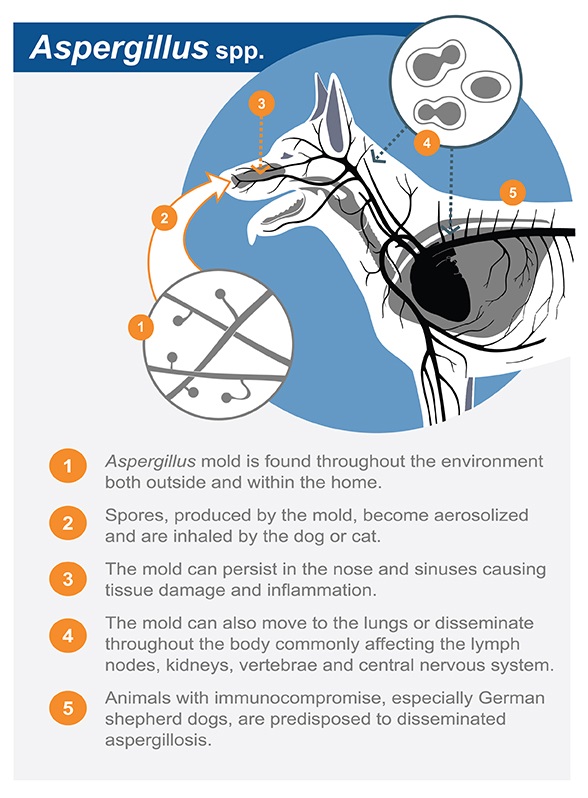Aspergillus
Clinical Signs of Aspergillosis
With disseminated disease, signs overlap with other inflammatory diseases including bacterial infection, cancer and immune mediated disease.
- Anorexia
- Weight loss
- Lethargy
- Fever, unresponsive to antibiotics
- Nasal discharge with depigmentation
- Nasal swelling
- Periorbital swelling
- Sneezing
- Cough
- Tachypnea or dyspnea
- CNS signs
- Lymphadenopathy
Treatment And Testing
For sinonasal aspergillosis, antibody testing is the most accurate non-invasive diagnostic test. For disseminated disease, urine and blood antigen testing is preferred. With the wide array of clinical presentations, multiple diagnostic tests are often required to confirm the infection.
- Aspergillus Galactomannan Antigen EIA
- Aspergillus Antibody by lmmunodiffusion
- (1-3) – β-D-Glucan Colorimetric Assay
- MVista® ltraconazole by Bioassay
What is Aspergillosis?
Aspergillosis is a fungal infection caused by Aspergillus, a common fungus found in both indoor and outdoor settings. People and animals with weakened immune systems are more susceptible to developing aspergillosis and additional health complications due to the infection. It is nearly impossible to avoid breathing in some Aspergillus spores in your home, but for those with a healthy immune system, it is often not harmful.
Aspergillus commonly grows on dead leaves, stored grain, compost piles, and other decaying vegetation. It can also be found as a lacy mold growing on foods. Fortunately, respiratory physical defenses (mucosa, branching airways, mucociliary apparatus) and innate immune system often limit invasion of the fungus thereby preventing infection.
Aspergillosis has two primary manifestations in dogs and cats – sinonasal infection and dissemination to multiple organ systems. German shepherd dogs are greatly predisposed for disseminated aspergillosis and dolichocephalic (long-snout) breeds, such as the Dachshund, Greyhound, Collie, or German Shepherd dogs are at increased risk for sinonasal disease.

Learn More About Aspergillosis
Disseminated aspergillosis should be considered in essentially any ill German Shepherd dog without a proven alternative diagnosis. In addition, sinonasal aspergillosis should be considered in any dog with chronic nasal disease, especially with nasal depigmentation.
